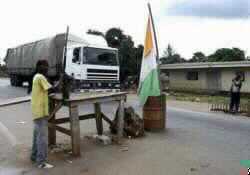- Author:
& News Agencies - Section:
WORLD HEADLINES
- Hajj & Umra WORLD HEADLINES
Ivory Coast Troops Speed to Quell New Revolt

Government troop reinforcements sped toward western Ivory Coast on Friday to try to quell the latest rebellion adding to creeping chaos in the once-stable West African country. Ivory Coast, the world's biggest cocoa producer, is cut in three -- the south under loyalist control, the north held by rebels for more than two months and a chunk of the west now in the hands of other insurgents.
Eyewitnesses in western Ivory Coast reported large numbers of reinforcements joining loyalists regrouping after being driven on Thursday from the towns of Danane and Man, over 400 miles from the main city of Abidjan. But as residents said the army build-up gathered pace at Duekoue, 60 miles south of Man, the rebels holding the town said they were planning to advance south.
"We are going to continue our progress," said Major Deli Gaspard, spokesman of the newly-created Movement for Justice and Peace, which says it simply wants President Laurent Gbagbo's head for the killing of a former junta leader.
The latest trouble has shifted turmoil back toward the cocoa growing regions of a country producing 40 percent of world supply of the beans used to make chocolate.
Young rebels in stolen pickup trucks cruised the streets of the western towns, firing in the air. Hundreds of people in Danane tried to flee to nearby Liberia and Guinea -- themselves caught up in a savage and messy regional conflict.
On Ivory Coast's other battle front, French troops reported that Gbagbo's forces and foreign mercenaries had pulled back behind a cease-fire line after striking into territory held by the main Patriotic Movement of Ivory Coast rebel group.
Soldiers from the former colonial power are monitoring a truce agreed six weeks ago by rebels who have held most of the largely Muslim north since a failed coup began the war on September 19. Hundreds died in four weeks of fighting.
LITTLE PROGRESS AT TALKS
The latest violence has added to confusion at peace talks between the main rebel group and government negotiators in Togo. Nearly a month of wrangling has brought little sign of a deal.
Mediators rejected the latest rebel peace proposals late on Thursday. They have ruled out the rebel demand for a "New Political Order" which would mean removing Gbagbo.
The MPCI accuses Gbagbo of encouraging ethnic discrimination and wants the president -- a Christian from the southwest -- to step down to allow new elections.
The new faction is linked to late junta leader Robert Guei, who ruled for 10 months after a 1999 coup and was shot dead by loyalists on the day of the failed putsch. Guei was a westerner.
"We are in danger of a Liberia-type scenario here," said one African diplomat, referring to the years of tribal-based faction war that tore apart Ivory Coast's neighbor in the 1990s and left a legacy of lingering conflict.
For decades after independence in 1960, Ivory Coast was a model of stability in the fragile region, but tension among dozens of tribes grew steadily after the death of founding President Felix Houphouet-Boigny in 1993.
The government rejects rebel accusations of discrimination and says the insurgents are power-hungry army deserters in the pocket of neighboring states.
Gbagbo's adviser in Europe dismissed the newly emerged rebels as covers for the MPCI. He said two groups had been identified -- the Movement for Justice and Peace and another band saying it represented the interests of western Ivory Coast.
"As long as the MPCI and its surrogates continue to provoke us, we will pursue the offensive," Toussaint Alain told Reuters.
PHOTO CAPTION
A young man in the village of Gourominankro, just south of Ivory Coast's administrative capital of Yamoussoukro, stops and searches vehicles on the main road to Abidjan, on November 27, 2002. Government troop reinforcements sped towards western Ivory Coast to quell the latest rebellion in the once-stable West African country. (Luc Gnago/Reuters)
Related Articles
 Hajj virtues
Hajj virtues
-
School of Faith in Ten Days of Thul-Hijjah
The believing human self needs strong provocations in order to awaken whenever it is enveloped by laziness in...
-
The Status of Hajj in Islam
Hajj is the fifth pillar of Islam; Allah, The Exalted, ordained it in the ninth year after Hijrah (the Prophet's,...
-
School of Faith in Ten Days of Thul-Hijjah
The believing human self needs strong provocations in order to awaken whenever it is enveloped by laziness in relation...


 Home
Home Discover Islam
Discover Islam Quran Recitations
Quran Recitations Lectures
Lectures
 Fatwa
Fatwa Articles
Articles Fiqh
Fiqh E-Books
E-Books Boys & Girls
Boys & Girls  Hajj Rulings
Hajj Rulings Hajj Fatwas
Hajj Fatwas












